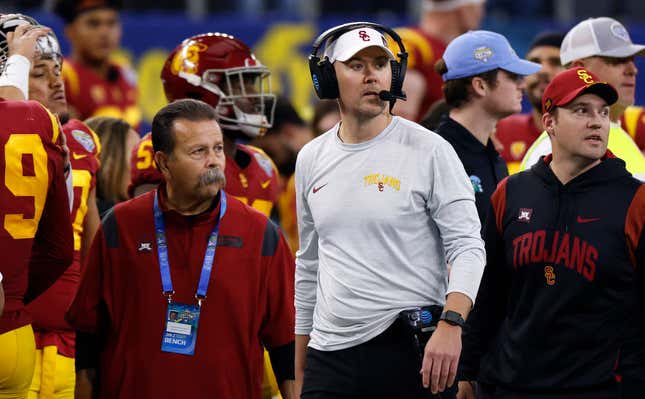
The old African-American proverb “If you scared, get out the club,” isn’t just a warning to terrified patrons to exit the building — it’s wise counsel to coaches who don’t like facing the music.
For the second time this season, USC head football coach Lincoln Riley has acted like an overbearing sports dad by shutting down access to reporters because his rumored $110 million contract doesn’t allow him to control everything that’s connected to his program.
The reason?
Utah beat the Trojans 34-32 last Saturday in Los Angeles. It was Riley’s third loss to the Utes in two years, as Utah has beaten USC four straight times. The Trojans’ dreams of a College Football Playoff appearance are over. Caleb Williams can kiss a second-straight Heisman Trophy goodbye.
“Give credit to Utah. We’ve had three great games with them. Great competitors. It was a heck of a ballgame,” said Riley, as he was the only one to speak to reporters after the game since he didn’t make any players available to the media.
This wasn’t a one-off, it’s a spinelessness pattern with Riley.
Just last month, USC reinstated a suspended beat reporter after Riley and the school banned Luca Evans of the Southern California News Group due to “violations of the Trojans’ media policy” because he did his job. Check this out from For The Win:
“Evans’ offenses include quoting freshman tailback Quinten Joyner at a USC media availability — but not during the part where the team wanted him to talk — as well as saying hello to players and staffers he saw around campus and emailing various athletic department officials to introduce himself as the new guy in town.”
The two-week suspension, which was cut down to one, was already bad enough. Riley’s explanation was even worse.
“I don’t feel like we have too many rules, too many policies,” said Riley about the suspension, according to the Orange County Register’s Jim Alexander. “But the ones that we do have, we take them seriously, because my first job — even though it is part of my job — is not to the media, it’s not to the fans, it’s not to anybody else. It’s to protect our players. And that is first and foremost, that will always be priority number one.”
I guess teaching his players about accountability and lying in the bed they made aren’t a priority for a coach who leads one of the greatest programs in the history of the sport in a city that’s a global media hub.
However, this isn’t only happening in L.A.
Last week, the WNBA fined the New York Liberty $25,000 and team members Sabrina Ionescu, Jonquel Jones, and Betnijah Laney $2,000 because players declined media interviews after losing the finale of the WNBA Finals to the Las Vegas Aces on the Liberty’s home floor. According to the league, the head coach, and two players must attend the postgame news conferences.
Players and coaches never run away from questions when they win. It’s only a problem when they lose games they thought they were going to win — that’s a coward’s mentality.
But while Riley has been the ire of many in the press for his antics this season, he’s nowhere as bad as a certain college football head coach that so many in the media have been obsessed with for months — Deion Sanders.
In 2021, the Black coach had a Black reporter banned after Sanders and Jackson State University blocked former Clarion-Ledger reporter Rashad Milligan from covering the team. Milligan was preparing to ask some tough questions at SWAC Media Day due to a report detailing how one of Sanders’ most coveted recruits was charged with assaulting a woman.
“A Clarion-Ledger reporter was punished for simply doing his job,” said former Clarion-Ledger Executive Editor Marlon A. Walker. “The decision to interfere with a working journalist is not only disappointing but also intolerable. It runs counter to the Clarion-Ledger’s unwavering mission to freely and fully inform readers throughout Mississippi. It is imperative to stand strong against any attempts to disrupt that effort.”
Like Riley, Sanders eventually lifted the ban. But also like with Riley, the damage was done.
“It never felt as if the air was really cleared, though,” Walker previously told Deadspin. “Even after we changed reporters it was difficult. Deion Sanders made it hard for all local news reporters to cover the football team, mostly because he preferred national press, which was no secret.”
This has not been a column in defense of “the media” or reporters, as many in this industry have done — and are still doing — dumb stuff that deserves ridicule and distrust. However, there are far too many times in which “the media” and reporters are blamed for things they didn’t do, or are yelled at by the public for not covering things when “the media’s” coverage of said thing is the sole reason they know about it.
What’s happened over the last few weeks and months isn’t new, as we’ve seen it done in sports before. However, the next time you see a coach suspend/ban a reporter or keep their players from showing up to a press conference, know that it’s due to them losing or running from a question that deserves to be answered.